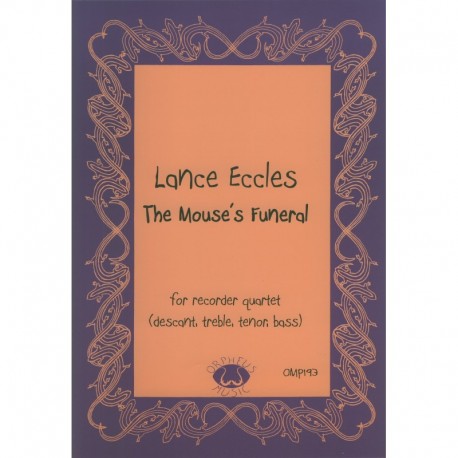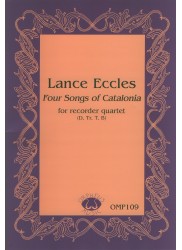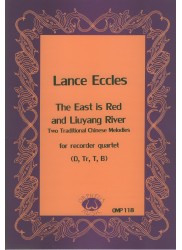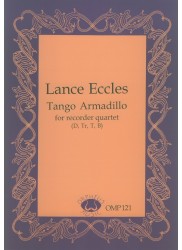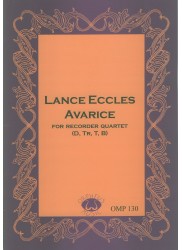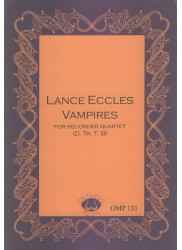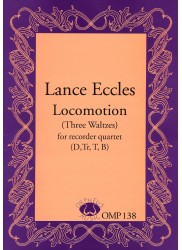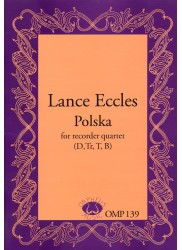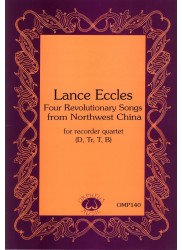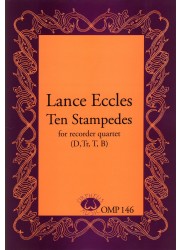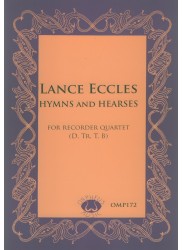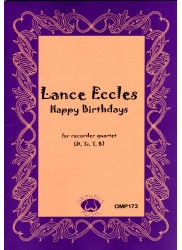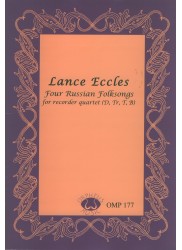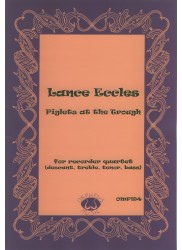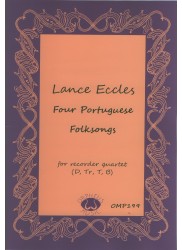No products
Prices are tax included
The Mouse's Funeral
Composer: Eccles - Lance
Instrumentation: Descant - Treble - Tenor - Bass
Period/genre: Australian Contemporary
Grade: Moderate
More info
*Contemporary Pieces.* Nicely ironic set of pieces with some pleasant close harmony and a lively dance at the wake.
1. In the Church
2. At the Graveside
3. At the Wake
_Score 8 pp. Part 4 pp._
REVIEWS OF TEN COMPOSITIONS BY LANCE ECCLES
(Orpheus Music, orpheusmusic.com.au).
For 20 years, Lance Eccles was a member of the Reluctant Consort, a group based in Sydney, Australia. Most of his compositions have been written for this consort or for meetings of the Sydney Society of Recorder Players. Eccles is retired from his position as a senior lecturer in Chinese at Macquarie University. His current web site states that he is an "honorary senior research fellow in the Department of Ancient History at Macquaie University in Sydney, Australia"; see www.ocs.mq.edu.au/~leccles.
There are generalities that apply to many of the pieces reviewed here. The reader will note that all of the pieces have colorful programmatic titles. Sometimes, the music des indeed match the literary ideas of the titles. In this reviewer's opinion, there are other cases (as specifically noted below) where the literary images of the title and the actual music do not seem to connect. It may be, in some cases, that some words in these titles simply have other connotations in Australian culture. In any case, a simple solution for this problem would be for the publications to include information regarding the literary ideas behind the titles and how these ideas connect to the music.
Concerning his style, rhythms are straightforward and on the easier side, oftentimes using light syncopation. For the most part, the voices are very active, with a common exception being the bass lines. It is rare for the upper voices to hold any note longer than a halfnote, sometimes even in the final measures. Eccles has a remarkable ability to have voices moving every half beat for extended passages. He does a great job keeping his voices in lively contrary motion, but he also uses parallel motion to great effect. He likes abrupt endings.
Some of his music uses lush Romantic harmonies; some is more contemporary and mildly dissonant or even sharply dissonant. Eccles is equally at home in all these harmonic idioms. To enjoy hearing and playing Eccles's music, you will need a taste for contemporary harmony. Having said that the rhythms are easy, I should also mention that most of his music is quite chromatic. If your groups are interested in playing these pieces, get out the chromatic scales; you will need to know all chromatic fingerings.
Eccles likes to use phrase modulations to distantly-related keys. There are no avantgarde techniques in any of these pieces, beyond simple flutter-tonguing. If I had to rate them for difficulty on a scale of one to five, most would rate a three with exceptions noted below.
Regarding prices listed, Orpheus Music will remove taxes from the total for non- Australian customers. Prices vary day to day. These pieces are listed with two purchase options: the published version (in hard copy with the well-known purple and orange covers) and the .pdf instantly-downloadable version from orpheusmusic.com.au.
OMP193 Lance Eccles THE MOUSE'S FUNERAL.
I liked the pieces in The Mouse's Funeral so much that, for me, the title is something of a distraction from the music. The first piece, "In the Church," begins with a section of dissonant chords imitating bells, followed by a consonant couple of measures imitating an organ. Next appears a chorale-type hymn - nicely arranged, with well-balanced movement in all the voices.
A striking section of the piece is entitled "liturgy." Here there is constant movement - at least one voice on every eighth note, sometimes just by syncopating one of the parts. The piece ends in a re-arranged setting of the hymn.
The somber second piece, "At the Graveside," is a short 34-measure piece with the performance direction, "slow and sighing." It features sharp, accented skips into dissonances - D against D, G with G. The mood is certainly appropriate for the graveside.
"At the Wake" starts out sounding more Classical than contemporary - but not for long. By measure three, we hear cross relations (B against B). This piece is very playfully active, with the most fun in the soprano part.
Eccles uses some of his signature phrase modulations, the first going from G Major to C minor. In some measures, all parts come together for a dissonant, syncopated moment. This is, altogether, a fun piece to play - a piece with a celebratory atmosphere.
Susan Groskreutz, American Recorder, January 2011.
The Mouse's Funeral
SATB recorders
Orpheus Music, OMP 193
The Mouse's Funeral is also a programme piece in the three movements In the Church' opens with a very effective tolling of bells, followed by the organ softly playing, and leads into the first hymn. Next follows a chant in organum which introduces the Liturgy which is also interspersed with chants. A Eulogy follows and the final hymn finishes the movement. The instructions for 'Bell, organ, hymn' etc are printed on the score and on the descant part only, but it is a pity that they weren't reproduced on the other parts so that these players could enter into the mood of the piece as well. I am sure I heard a reference to Three Blind Mice' incorporated into the sighing of the mourners. The final movement, At the Wake', is a jovial piece which travels through several modulations and gathers rhythmic complexity as the mourners get more intoxicated. There are plenty of challenges in The Mouse's Funeral' to keep players on their toes.
Janice Ormerod, Recorder Mail Summer 2009 p.74
30 other products in the same category:
Reference: OMP109
Brand: Orpheus Music
Four Songs of Catalonia
Composer: Eccles - Lance Instrumentation: Descant - Treble - Tenor - Bass...
In StockReference: OMP109.pdf
Brand: Orpheus Music
Four Songs of Catalonia
PLEASE NOTE - DOWNLOADABLE PDF VERSION Composer: Eccles - Lance...
$22.00 -20%In StockReference: OMP118
Brand: Orpheus Music
The East is Red and Liuyang River
Composer: Eccles - LanceInstrumentation: Descant - Treble - Tenor -...
In StockReference: OMP118.pdf
Brand: Orpheus Music
The East is Red and Liuyang River
PLEASE NOTE - DOWNLOADABLE PDF VERSION Composer: Eccles -...
$17.50 -20%In StockReference: OMP121
Brand: Orpheus Music
Tango Armadillo
Composer: Eccles - LanceInstrumentation: Descant - Treble - Tenor -...
In StockReference: OMP121.pdf
Brand: Orpheus Music
Tango Armadillo
PLEASE NOTE - DOWNLOADABLE PDF VERSION Composer: Eccles -...
$16.00 -20%In StockReference: OMP129
Brand: Orpheus Music
Ruins
Composer: Eccles - LanceInstrumentation: Descant - Treble - Tenor -...
In StockReference: OMP129.pdf
Brand: Orpheus Music
Ruins
PLEASE NOTE - DOWNLOADABLE PDF VERSION Composer: Eccles -...
$22.00 -20%In StockReference: OMP130
Brand: Orpheus Music
Avarice
Composer: Eccles - LanceInstrumentation: Descant - Treble - Tenor -...
In StockReference: OMP130.pdf
Brand: Orpheus Music
Avarice
PLEASE NOTE - DOWNLOADABLE PDF VERSION Composer: Eccles -...
$20.50 -20%In StockReference: OMP131
Brand: Orpheus Music
Vampires
Composer: Eccles - LanceInstrumentation: Descant - Treble - Tenor -...
In StockReference: OMP131.pdf
Brand: Orpheus Music
Vampires
PLEASE NOTE - DOWNLOADABLE PDF VERSION Composer: Eccles -...
$20.50 -20%In StockReference: OMP138
Brand: Orpheus Music
Locomotion
Composer: Eccles - LanceInstrumentation: Descant - Treble - Tenor -...
In StockReference: OMP138.pdf
Brand: Orpheus Music
Locomotion
PLEASE NOTE - DOWNLOADABLE PDF VERSION Composer: Eccles -...
$20.50 -20%In StockReference: OMP139
Brand: Orpheus Music
Polska
Composer: Eccles - LanceInstrumentation: Descant - Treble - Tenor -...
In StockReference: OMP139.pdf
Brand: Orpheus Music
Polska
PLEASE NOTE - DOWNLOADABLE PDF VERSION Composer: Eccles -...
$20.50 -20%In StockReference: OMP140#
Brand: Orpheus Music
Four Revolutionary Songs from North West China
Composer: Eccles - Lance Instrumentation: Descant - Treble - Tenor - Bass...
In StockReference: OMP146
Brand: Orpheus Music
Ten Stampedes
Composer: Eccles - LanceInstrumentation: Descant - Treble - Tenor -...
In StockReference: OMP146.pdf
Brand: Orpheus Music
Ten Stampedes
PLEASE NOTE - DOWNLOADABLE PDF VERSION Composer: Eccles -...
$36.00 -20%In StockReference: OMP172
Brand: Orpheus Music
Hymns and Hearses
Composer: Eccles - LanceInstrumentation: Descant - Treble - Tenor -...
In StockReference: OMP172.pdf
Brand: Orpheus Music
Hymns and Hearses
PLEASE NOTE - DOWNLOADABLE PDF VERSION Composer: Eccles -...
$28.00 -20%In StockReference: OMP173
Brand: Orpheus Music
Happy Birthdays
Composer: Eccles - LanceInstrumentation: Descant - Treble - Tenor -...
In StockReference: OMP173.pdf
Brand: Orpheus Music
Happy Birthdays
PLEASE NOTE - DOWNLOADABLE PDF VERSION Composer: Eccles -...
$20.50 -20%In StockReference: OMP177
Brand: Orpheus Music
Four Russian Folksongs
Composer: Eccles - LanceInstrumentation: Descant - Treble - Tenor -...
In StockReference: OMP177.pdf
Brand: Orpheus Music
Four Russian Folksongs
PLEASE NOTE - DOWNLOADABLE PDF VERSION Composer: Eccles - Lance...
$20.50 -20%In StockReference: OMP193.pdf
Brand: Orpheus Music
The Mouse's Funeral
PLEASE NOTE - DOWNLOADABLE PDF VERSION Composer: Eccles -...
$20.50 -20%In StockReference: OMP194
Brand: Orpheus Music
Piglets at the Trough
Composer: Eccles - LanceInstrumentation: Descant - Treble - Tenor -...
In StockReference: OMP194.pdf
Brand: Orpheus Music
Piglets at the Trough
PLEASE NOTE - DOWNLOADABLE PDF VERSION Composer: Eccles -...
$20.50 -20%In StockReference: OMP199
Brand: Orpheus Music
Four Portuguese Folksongs
Composer: Eccles - LanceArranger: Lance EcclesInstrumentation: Descant -...
In StockReference: OMP199.pdf
Brand: Orpheus Music
Four Portuguese Folksongs
PLEASE NOTE - DOWNLOADABLE PDF VERSION Composer: Eccles - LanceArranger:...
$22.00 -20%In Stock

